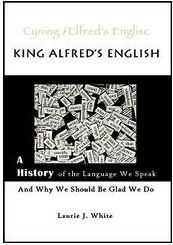Lately I have been reading a book about the history of the English language. Some of you might find this subject yawn-inducing. Depending on the author, I might, too! However, Laurie J. White, the author of King Alfred's English, did a wonderful job of writing a book that is both informative and interesting. Once I started reading, I found myself finding little tidbits here and there which were new to me. The author's tone is conversational, so that while the book is educational, you don't feel like you're reading a text book.
From the author's website, The Shorter Word:
Did you know?Personally, I am younger than 50, but even though I do not (think) I pronounce the "h" in "when", the words "when" and "win" do not sound the same when I speak them, so the second point above is interesting to me.
- The English were NOT the British. In fact, they fought each other…a lot. And still today, if you call an English person British, he might very well correct you even though he knows you probably won’t understand.
- You probably don’t pronounce the word “when” like your parents. When you say “when” and “win,” do these words sound the same? If you’re under 50, they probably do. If you’re older, you may still pronounce the sound of the “h” and the words sound slightly different. I still pronounce the “h,” do you?
- The Brothers Grimm compiled German fairy tales, but they were also famous philologists (and what IS a philologist?)
- There’s a law for the way languages change that backs up Intelligent Design.
- For over 300 years the official language of the English court was…French! Seriously. But the English were always fighting the French. That’s true. Find out why.
- There’s a reason we write “knight” but say “nite,” and you won’t believe how they used to pronounce it.
- It was once punishable by death to translate even portions of the Bible into English! Yikes!
- Recent scholarship has shown that at least 80% of the King James Bible is the translation work of just one man. Who was he?
My favorite part of the book is actually in the third chapter. The author talks about how language actually points to intelligent design (i.e. God, the Creator) rather than backing up evolution. I love that the author comes at the subject from a blatant Christian view point. I frankly think we should be able to examine all subjects through the lens of faith in God and His Word, and I love it when I come across materials that support me in this endeavor.
King Alfred's English is appropriate for those at a middle school reading level or higher. I personally have not found any portions that I felt were unsuitable for my older two children (7th grade, ages 11 and 12). I think there is plenty to be gleaned from simply reading the book. However, there is also free supplemental materials on the author's website, The Shorter Word, including "images, articles, videos, primary sources, and literature related to each chapter," as well as tests and worksheets. I certainly plan on using the book in the future with my children, as I feel it would be an interesting take on not only the history of the English language, but also the history of England in general.
King Alfred's English is available through several different outlets. It varies in price depending on retailer from $14.89 for a soft-cover version to $5.95 for the Kindle version.



No comments:
Post a Comment